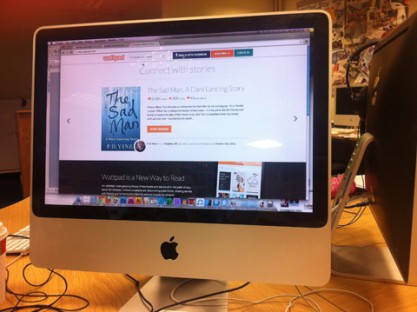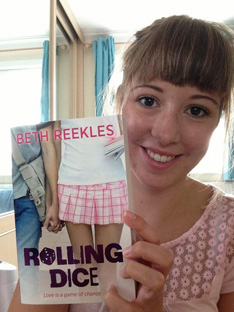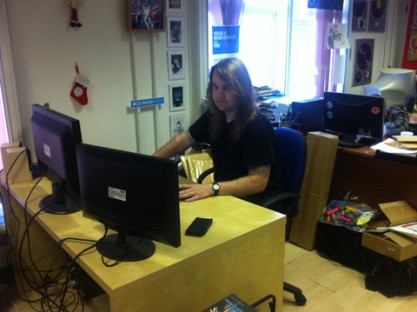 Online publishing site like Wattpad have provided a medium for young writers to publish their work online
Online publishing site like Wattpad have provided a medium for young writers to publish their work onlineWrite, publish, comment, share. Write, publish, comment, share. The immediacy of online publication of literature has developed a platform for writers to present their work to a vast audience with faster communication between writer and reader.
Authors like 19-year-old Newport native Beth Reeks, who earlier this year was announced as one of Time magazine’s 16 most influential teenagers of 2013. Having scored a three-book deal with Random House publishing in 2011, Reeks – under the pen name Beth Reekles – has come a long way from publishing stories for fun online.
According to statistics released in The Welsh Book Council’s 2012/13 Report stated that 1,579 novels written by Welsh authors were added to its distribution centre and 657 Welsh e-books were available on Gwales. With the largest and most revered publishing houses based in England, Wales has become a hotspot for smaller publishing companies. But why has there been a dramatic rise in alternative publishing in Wales?
Publishing into the online void
Unlike traditional methods of publishing physical books, publishing online allows the author to release work in instalments. Online communities like Wattpad, the site Reeks used to publish her work prior to being signed, allow authors to get immediate feedback from readers commenting and sharing their work. In a sense the audience provides the roles of editor and marketer without the exuberant fees.
“I was so excited I could hardly breathe. It was completely insane to think that I might actually be a published author.”
Add this to the fact that you can download and read work from Wattpad for free and you can build a global audience that attracts the attention of one the UK’s biggest publishing companies. That’s exactly what happened to Beth Reeks. After 19 million people downloaded, read and shared her first novel The Kissing Booth, she was contacted by Lauren Buckland a senior editor at Random House. “When I first read the message she sent me, I didn’t quite believe it,” said Reeks, ”I let out some weird, choked noise and ran into my parents to show them, and I was so excited I could hardly breathe. It was completely insane to think that I might actually be a published author.”
[youtube]http://www.youtube.com/watch?v=XaKwX9KczEM[/youtube]
The rise of Indie publishers
Indie publishing companies have been showing great success in Wales. Seren has leading the way for indie publishing for over 30 years. Seren has a number of award-winning texts in its publishing history. Robert Minhinnick’s To Babel and Back Again was named Welsh Book of the Year in 2006.
Steve Upham started his own publishing company Screaming Dreams after struggling to break into designing book cover art for mainstream publishers. This difficulty is a pattern that Upham has noticed with authors and artist across Wales. He explained, “There is a frustration because there is limited opportunity to get published by the big publishers so people start looking elsewhere.”
Upham identified that although using a smaller publisher allows an author to work very closely with editors, the smaller financial budgets make it difficult to launch large scale publicity events. Instead smaller publishers rely heavily on social media to publicise new releases, allowing interested parties to comment on publications and share the release worldwide.
Using his experience at Screaming Dreams, Upham helped launch another independent publisher Candy Jar Books, which was established in Cardiff Bay in 2011 and has been publishing hard copy books and e-books. The publishing company went on to launch a self-publishing partner Jelly Bean Books in 2012.
[youtube]http://youtu.be/kcBD5nwv-u8[/youtube]
Publishing and events manager at Jelly Bean Hayley Cox explained there are a number of factors that can make or break an online publication, “It can be difficult to make it look professional which is the key to attracting readers,” she said, “a good cover design, comprehensive edit and expert formatting can make the difference between a good and bad review.”
A little bit of luck
Beth Reeks is one of a lucky few who have found success through self-publishing online. The amount of online publications means that an author has to be the best in order to gain recognition. However, this doesn’t differ too far from the struggles of some of the UK’s most successful authors: Twelve different publishing companies rejected J.K Rowling before Harry Potter was published by Bloomsbury. Meanwhile, E.L James famously published 50 Shades of Grey on fanfiction websites before Random House published the novel. For now though it appears that directing manuscripts towards smaller publishing companies and pushing content onto the web to create a readership is not a bad place to start for upcoming authors. Write, publish, comment, share; the cycle continues.


